| |
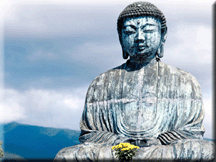
Highly Significant
Buddha Codes
Found in Isaiah 40-46
In his bestselling book, The Religions of Man, Huston Smith begins his chapter on Buddhism with these observations:
Buddhism begins with a man. In his later years, when India had become electric with his message and kings themselves were bowing before him, people came to him even as they were to come to Jesus asking what he was. How many people have provoked this question: not "Who are you?" with respect to name, origin, or ancestry, but "What are you?—what order of being do you belong to, what species do you represent?" Not Caesar, certainly. Not Napoleon, not even Socrates. Only two, Jesus and Buddha. When the people carried their puzzlement to the Buddha himself, the answer he gave provided a handle for his entire message.
"Are you a god?" they asked. "No." "An Angel?" "No." "A saint?" "No." "Then what are you?"
Buddha answered, "I am awake." His answer became his title, for this is what Buddha means. In the Sanskrit root budh denotes both to wake up and to know. Buddha, then, means the "Enlightened One" or the "Awakened One."
After completing our searches for extensions to Yeshua ELSs found in the "Who is Like God?" verses of Isaiah 40-46, it occurred to us that it would be interesting to also search for extensions to Buddha ELSs in these same verses. And, while at it, we also searched for extensions to Muhammad and Moses ELSs in those same verses. If the literal text is asking a clear question, perhaps the extended codes interwoven in those verses might provide potential answers to that question. Or, at least, they might include content that people of each respective religion might recognize as being relevant to the founder of their beliefs. We did not return disappointed, but rather with astonishment at the extended codes that Nathan Jacobi, Ph.D., found.
Finding Enlightenment
What did we find among the Buddha codes in Isaiah 40-46 verses that ask the question, "Who is like God?" We found nine extended codes, most of which present a distinctly Buddhist point of view. Enlightenment is a persistent theme in these findings:
- The judge has returned. They have cried moistly when Buddha has enlightened.
- Buddha is proper and sealed. Indeed, a candle.
- You will propose my lamp, Buddha and God.
- . . . They have reached a high level as a living friend and an oasis.
The content of these codes should be familiar to Buddhists. Does that affirm Buddhism? Not necessarily. What it affirms is that the author of the Bible knew a great deal about Buddhism well before Buddha was born (circa 560 BC). As Isaiah 1:1 states, Isaiah prophesied during the reign of four kings (each of whom predated Buddha):
- Uzziah, who reigned from 791 BC to 740 BC.
- Jotham, who reigned from 740 BC to 735 BC.
- Ahaz, who reigned from 735 BC to 716 BC.
- Hezekiah, who reigned from 716 BC to 687 BC.
According to Isaiah 6:1, Isaiah became a prophet in the year that King Uzziah died (740 BC).
Codes: Truth or Points-of-View?
It has long been the view of BCD that the content of Bible codes represents one of many well-known points of view. In the case of religious matters, the point of view of any given code might be Jewish or Christian, Muslim or Buddhist, or of some skeptic or antagonist to any of these faiths. Our view has been affirmed by these new findings.
If we were to espouse the notion that codes only present truth, then we would run into several hazardous dilemmas. In that case, the content of codes would then strongly compete with the literal text as a source of truth. Contradictions could stand out, not only between different codes, but between individual codes and the literal text of the Bible. Code proponents from different faiths could clash over the findings, citing this or that extended code as proof that their beliefs were correct. Since the translator has the privilege to choose where to place spaces between the Hebrew letters, at times multiple translations are possible. Some of these alternative translations may contradict one another. That is not the kind of environment in which scientific investigations would progress smoothly.
Our view is that the content of individual Bible codes is much like the content of individual phrases from the Bible itself, plucked out of context, and left standing on their own. Out of context, Biblical phrases can contain falsehoods, especially when they are part of a quotation from an untruthful source. Witness Genesis 3:4-5:
"You will not surely die," the serpent said to the woman. "For God knows that when you eat of it your eyes will be opened, and you will be like God, knowing good and evil." (NIV)
The serpent is a liar and phrases or sentences taken from his words are lies. And yet they are in the Bible. Taking things out of context from any text is dangerous. And so it is that relying on the content of individual Bible codes, taken out of context, as they inherently are, is dangerous.
Why BCD Keeps Searching
Why then does BCD continue to search for extended Bible codes? Because the very high frequency of such lengthy codes as we have found is compelling evidence of the reality of the entire phenomenon, and of the supernatural origin of the Bible. That is reason enough to continue. Admittedly, we are also motivated to continue by our very human curiosity about what individual codes might say. There is nothing wrong with that, as long as we don't get hung up on that content as an indicator of truth.
What of the very high frequency of Buddha codes in Isaiah 40-46? We examined 20 Buddha ELSs for extensions and found eight codes with two or more extensions—even though we would only expect to find two such longer codes by chance. We found five codes with three or more extensions—even though we would only expect to find one such code, half of the time. These and other results are summarized below.
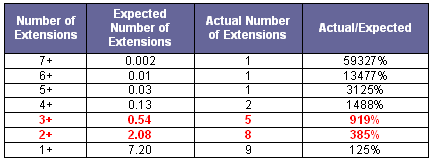
These findings reiterate the pattern we have consistently seen in other code searches. Either there is no extension to an initial ELS term, or if there is an extension, most likely there is another extension, or several additional extensions. That is a highly non-random pattern.
What are the chances that this collection of Buddha codes is the product of chance? Based on a chi-square probability calculation that evaluates the magnitude of differences between the expected and actual number of codes with each possible number of extensions, the probability of chance occurrence is one in
3,764,000,000,000,000,000,000,000,000,000,000,000,000,000,000,000,000,000,000,000,
000,000,000,000,000,000,000,000,000,000,000,000,000,000,000,000,000,000,000,
000,000,000,000,000,000,000,000,000,000,000,000,000,000,000,000,000,000.
The above odds ignore the fact that all, or nearly all, of the Buddha codes consist of content pertinent to Buddha. In other words, their content isn't just Hebrew words that hang together with acceptable grammar, even if they don't make logical sense. These codes speak to Buddhists! If we were to factor in the probability that the content of these codes would be relevant to Buddha, the odds would be dramatically more remote. We don't need to attempt to do that, however, because our findings are conclusive—without considering this subjective element.
Out of 67 opportunities, Jacobi had to find an extension, he found one 27 times. That's a discovery rate of 40.3%, which is far above the discovery rate observed in non-encoded Hebrew texts (16% to 20%).
What are the chances that the collection of Yeshua codes in Isaiah 40-46 is the product of chance? Based on the same calculation used in evaluating that probability for the Buddha codes, the probability of chance occurrence is one in
165,000,000,000,000,000,000,000,000,000,000,000,000,000,000,000,000,
000,000,000,000,000,000,000,000,000,000,000,000,000,000,000,000.
The above odds ignore the fact that all of the Yeshua codes consist of content similar to that in New Testament passages about Jesus. These codes sound familiar to Christians. If we were to factor in the probability that the content of these codes would be relevant to Jesus, the odds would be dramatically more remote.
Only Two: Jesus and Buddha?
We began this article with a quote from Huston Smith's The Religions of Man. In that quote, he claimed that only two people in human history have provoked the question, "What are you?" rather than "Who are you?" That question is much akin to the question repeatedly asked in Isaiah 40-46: "Who is like God?" Curiously, our research into extended codes in these verses yielded highly significant lengthy codes about Jesus and Buddha, but not about either Muhammad or Moses. Indeed, a fundamental tenet of Judaism is that no human being has ever been like God, and to make such a claim would be blasphemous. Similarly, Muhammad did not claim divinity.
We should all be wary of any attempts to extract "truths" about any specific religion from Bible codes, as noted above. Nevertheless, it is interesting when the observations from an investigation of a group of Bible codes ends up with the same findings as that of a famous author of comparative religion.
Buddha
Buddha is Sanskrit for awakened or the enlightened one. According to Wikipedia, a Buddha is anyone who has become "fully awakened" or enlightened. Buddhism is non-theistic. Buddha is not the "God" of Buddhism. Buddha is a guide or teacher, and Siddhartha Gautama is not the only Buddha.
We searched for two different spellings of Buddha. One spelled with a heh and one spelled with an alef.
Buddha (heh)
Six of the 10 searches yielded results. We will highlight five of them. The first one raises our eyebrows quite a bit.
Get out, demon! Exalted Buddha:
with the milk of my palate having thickened—
who (are you) to call my name?
This code could be referring to Alavaka, the demon, whose story is summarized below.
"Alavaka lived near the city of Alavi and feasted on human flesh. He was so fierce, powerful and crafty that he was known as 'the demon'. One day, the King of Alavi went hunting for deer in the jungle and Alavaka caught him. The king begged to be released, but in return for his freedom the demon made a deal that he had to send one person every day into the jungle as an offering to Alavaka."
After many had died, the Buddha happened to be near the city. He "saw what was going to happen. Out of compassion for the king, the prince and Alavaka, the Buddha traveled the whole day to the demon's cave and in the evening he arrived at the entrance."
"The demon was away in the mountains, and the Buddha asked the gatekeeper if he could spend a night at the cave. When the gatekeeper left to inform his master about the request, the Buddha went into the cave, sat on the seat of the demon and taught the Dharma to his wives. When the demon heard what was happening, he hurried home, very angry. With his extraordinary power, he created a terrifying thunderstorm which shook and rattled the forest with thunder, lightning, wind and rain . . . Alavaka attacked the Buddha by throwing his spear and club at him, but before the weapons could touch him, they fell at the feet of the Blessed One."
Alternatively, the demon could be Mara, as described in Wikipedia.
In Buddhism, Mara is the demon who tempted Gautama Buddha by trying to seduce him with the vision of beautiful women who, in various legends, are often said to be his daughters. In Buddhist cosmology, Mara personifies unskillfulness, the "death" of the spiritual life. He is a tempter, distracting humans from practicing the spiritual life by making the mundane alluring or the negative seem positive.
What could the milk of my palate has thickened mean? From the Sayings of Buddha, we find the following: "Like fresh milk a bad deed does not turn at once." So the thickening of milk could be likened to the revelation of the true nature of a bad deed.
The next three codes each talk about light (guidance) in the form of a candle, a lamp, and fire, but each one has a different point of view. This one proposes the idea that Buddha is a candle, lighting the way for people to live. This code has a Buddhist point of view.
Buddha is proper and sealed. Indeed a candle.
In case you might think that Buddha and candle have little to do with one another, try typing "Buddha candle" into your search engine. You will likely come up with over one million search results! Such a candle is considered by Buddhists to be a means of invoking good fortune and enlightenment.
The next code presents a mixed point of view, calling upon Buddha and God to propose my lamp, or provide the light by which to live by.
You will propose my lamp, Buddha and God.
If you are unsure about the link between Buddha and a lamp, type in "Buddha lamp" into your search engine. There should be over one million search results. A Buddha lamp is felt to provide a source of enlightenment to a Buddhist.
The following code has a Jewish or Christian point of view, proclaiming to Buddha that the Lord is my fire.
The Lord is my fire, Buddha.
From Readings in Buddhist Philosophy, you can get some idea of the importance of fire to a Buddhist. It symbolizes passion. So this code could be paraphrased, "The Lord is my passion, Buddha."
Here is the last code we will highlight.
The mother in him is his heart. Buddha has a daughter from among you,
as well as strong hunger. Will he get scared? Let him be agreeable and be a prince.
They have reached a high level as a living friend and an oasis.
There is an organization called The Daughters of Buddha. See the article Helping the Daughters of Buddha for details.
Let him be agreeable and be a prince could refer to Buddha's initial place in life as a prince in a wealthy family.
From Wikipedia's entry on Buddha's Early Life and Marriage, we learn that Buddha was "destined to a luxurious life as a prince, and had three palaces (for seasonal occupation) especially built for him."
The following table provides all the findings for Buddha (heh).
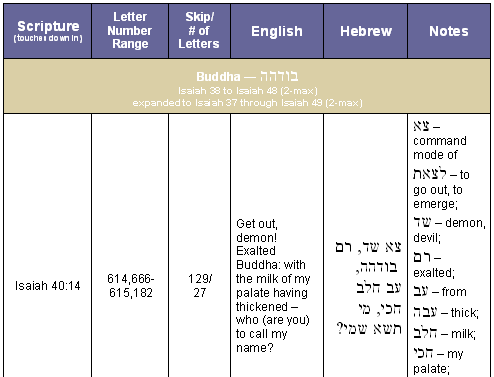
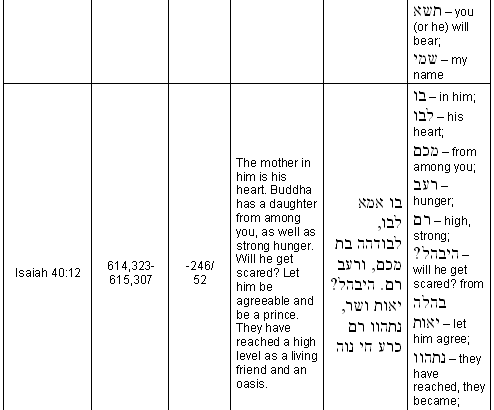
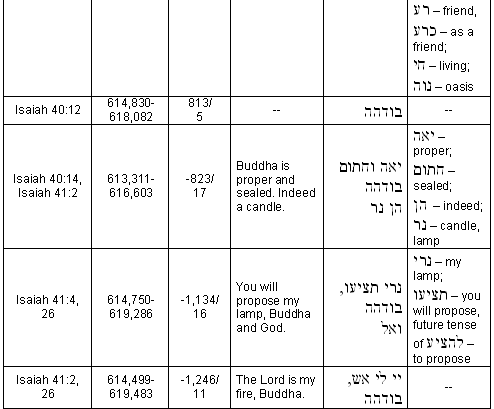
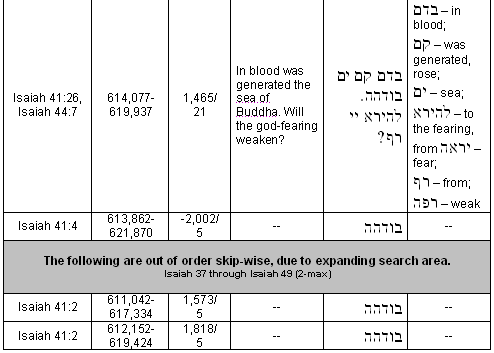
Buddha (alef)
Only three of the Buddha searches spelled with an alef yielded results.
This code is general enough in its content that it is not possible to discern its point of view.
Only remove your hand toward you and away from Buddha.
Because buddha literally means awakened or the enlightened one, the content of this code is particularly appropriate from a Buddhist point of view.
The judge has returned, they have cried moistly when Buddha has enlightened.
In the Bible, a mountain is a symbol of authority. So "Buddha the mountain" could mean "Buddha the authority." Oddly, though, the word "perhaps" adds an element of doubt to the perspective presented by this code.
Allow that he will be agreeable with me,
for Buddha the mountain is perhaps a source of experience.
From Wikipedia's entry Thousand Buddha Mountain, we learn:
The Thousand Buddha Mountain is a hill located southeast of the city of Jinan, the capital of Shandong Province, China. It is renown for its numerous Buddha images which have been carved out of the hill's rock faces or erected free-standing since the times of the Sui Dynasty and its Xingguochan Temple.
The following table lists the findings for Buddha (alef).
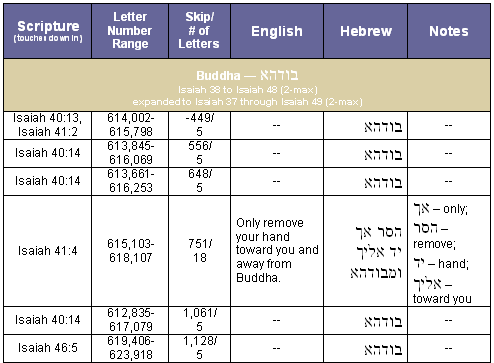
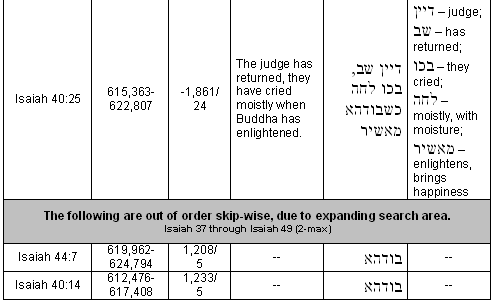
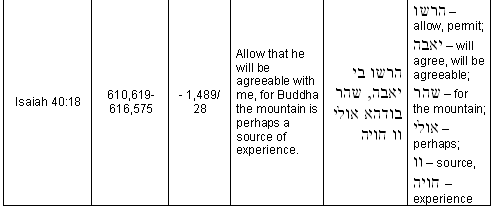
Muhammad
According to Wikipedia, Muhammad lived from approximately 570 to 632 A.D. and was the founder of Islam. He is considered by Muslims as "the last messenger and prophet of God." His "revelations" form the Koran, "regarded by Muslims as the 'word of God', around which the religion is based." In 632 A.D., after eight years of fighting, he and his followers (numbering 10,000) conquered Mecca. He died returning to Medina. By this time, "most of Arabia had converted to Islam."
Only two out of the 10 searches for Muhammad yielded results.
The following two codes appear to present a Muslim point of view.
Muhammad is my father's reward.
*****
The nest of Muhammad will walk in front of me,
by the Lord he poured into the vessel from you, the measure of love.
The following table lists the findings for Muhammad.
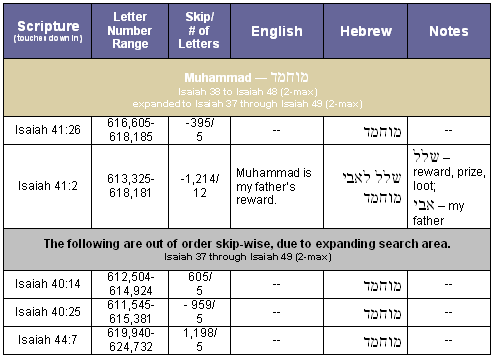
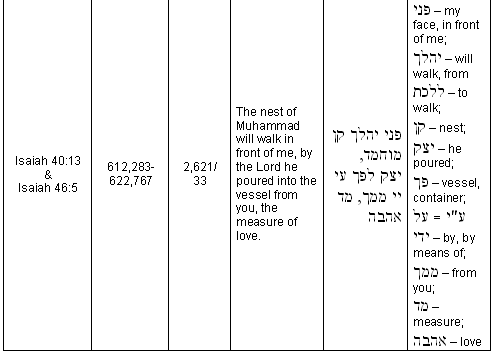

Moses
Only one of the 10 occurrences of Moses ELSs found in the "Who is like God?" verses resulted in extensions.
Curiously, in this code, reference is made to Jesse's father, who could be the grandfather of David, since Jesse was David's father.
Where has the burden of the heart fallen from?
From Moses? From Jesse’s father?
The following table contains the findings for Moses.
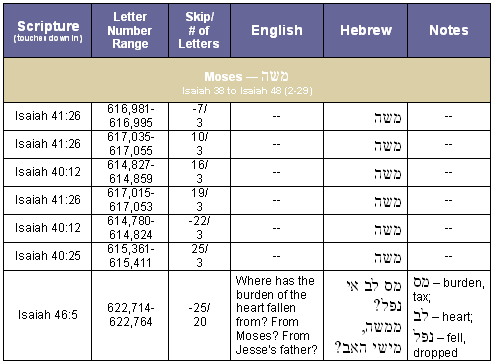

Comparison
Below is a comparison of the number of terms with extensions and the total number of letters in the extended codes, where the original search terms were Yeshua, Buddha, Muhammad, and Moses.
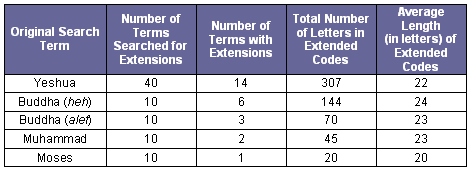
The following table summarizes the results of our searches to date.

A discovery rate of 16% to 20% would be comparable to that observed in non-encoded Hebrew texts. While the results for the Muhammad and Moses extensions could be viewed as the product of chance, the discovery rates for both Yeshua and Buddha codes is highly significant. Both are far beyond the range of what could be reasonably attributed to coincidence.
Scripture quotations marked "NKJVTM" are taken from the New King James Version®. Copyright © 1982 by Thomas Nelson, Inc. Used by permission. All rights reserved.
Scripture quotations marked "NIV" are taken from the HOLY BIBLE, NEW INTERNATIONAL VERSION®. NIV® Copyright ©1973, 1978, 1984 by International Bible Society. Used by permission of Zondervan. All rights reserved.
|
Enjoy finding your own Bible codes.
Bible code search software is available in our online store.
Subscribe Free! Sign Up Today!
Become a member of the non-profit Isaac Newton Bible Code Research Society.
Not only will you be part of the world's leading organization researching and publicizing Bible and Torah codes, but you will receive Bible Code Digest absolutely free, including . . .
- Latest Bible Code News
- Easy-to-Understand Bible Code Feature Articles
- Exciting Inside Information from Leading Code Researchers
- Details of Great New Discoveries
- Summaries of the Latest Battles Between Code Proponents and Skeptics
Stay current on Bible code news. Be first to hear about all of the latest Bible code discoveries.
Sign up to receive Bible Code Digest today.
|
|


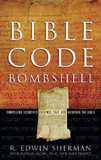 
Bombshell examines two massive, recently discovered clusters of codes in the Hebrew Old Testament. To read more about Bombshell, click here, or click below to order from Amazon today!
 
|







